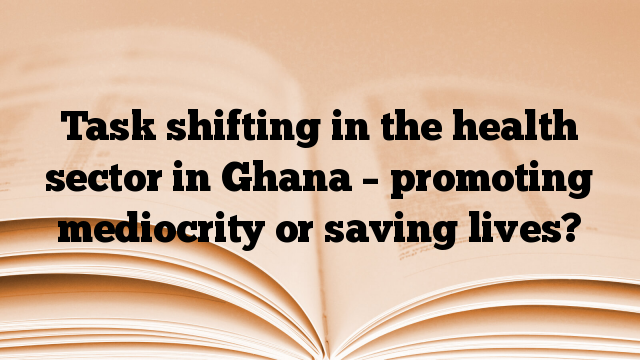The Certified Registered Anaesthetists (some people call them Nurse Anaesthetists, but they don’t like that name) are currently on strike in Ghana. This means Anaesthesiologists (Doctor Anaesthetists) have to give anaesthesia for surgeries across Ghana. I think this is a good time for all Ghanaians to sit back and reflect on the disparity in healthcare between the cities (Accra and Kumasi especially) and the rest of the country.
Some people (especially in the cities/teaching hospitals) have argued that task shifting (assigning some roles to non physicians) in the health sector in Ghana will breed mediocrity. What many of these people do not appreciate is that Ghana is not only Accra and Kumasi.
So our Certified Registered Anaesthetists are on strike. In this piece, I am not going into the ‘merits or demerits’ of the strike. My aim is to draw attention to the need (or otherwise) for task shifting in health in Ghana.
A few questions come up:
1. How many Anaesthesiologists (Doctor Anaesthetists) do we have in Ghana?
2. Where are these Anaesthesiologists (Doctor Anaesthetists) working in Ghana?
Apart from Accra and Kumasi (or the Teaching Hospitals), where in Ghana can we find these Anaesthesiologists (Doctor Anaesthetists)?
3. If we decide to stop Certified Registered Anaesthetists (Nurse Anaesthetists) from practising in Ghana, how many Anaesthesiologists (Doctor Anaesthetists) does Ghana need for effective healthcare delivery?
4. How long will it take to produce this number of Anaesthesiologists (Doctor Anaesthetists) to serve the whole Ghana?
5. As we work to produce this number of Anaesthesiologists (Doctor Anaesthetists) to offer the highest level of Anaesthesia services in Ghana, should hospitals in the districts/communities currently without Anaesthesiologists (but who only have Certified Registered Anaesthetists) stop performing surgeries and send patients who need surgeries to only hospitals with Anaesthesiologists?
6. Will the Anaesthesiologists (Doctor Anaesthetists) produced be ready to leave the cities (especially Accra and Kumasi) to go to the districts/remote communities to render anaesthesia services?I am not referring to once in a while ‘voluntary service’ here that some associations take so much pride in.
We need sustainable solutions in this country and we need people who understand the true picture on the ground (not in a few cities in the country) to lead the decision making. It is important that we are pragmatic when we try to address this situation of task shifting. It runs through several areas in health not only in Anaesthesia. I have written extensively on it in the area of cervical cancer prevention, where nurses can be trained to perform colposcopy.
If the elite (especially medical doctors) do not see this bigger picture, we shall become ‘Konongo kaya,’ the proverbial porter in Konongo who will not carry the load but will not allow anybody else to carry it. We must think beyond ourselves. The interest of the whole society or country should come before personal interests.


Thank you for your thought,
Doctors accepting posts to district hospitals can be taught some basic level of Anaesthesia. If a non-doctor (sometime without science background) can learn Anaesthesia in 18 months or so… then doctors after house job can certainly learn these core skills to function in a system such as exists in the districts.
Remember doctors post house job are already providing specialized services such as OBGYN and General Surgery.